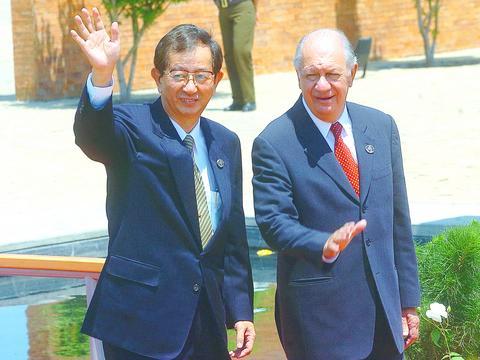US President George W. Bush Saturday sent a strong message to his Chinese counterpart Hu Jintao (
"The president pressed on our concern over the fact that there are so many missiles on the mainland that are pointed at Taiwan. He urged the Chinese side to act with restraint and prudence. It was the standard formulation that we have used in the past and it remains our consistent policy," said outgoing US Secretary of State Colin Powel.

PHOTO: YEH CHIH-MING, TAIPEI TIMES
Bush also made the point that neither side should take unilateral actions, which might prejudge the ultimate peaceful resolution of this issue, Powell said.
Powell made the remarks Saturday afternoon in response to a media inquiry about the Chinese authorities' earlier interpretation of the US government's stance on cross-strait policy during the closed-door meeting between Bush and Hu in the morning.
The Chinese foreign ministry claimed that Bush had specifically told Hu that the US government will not send any "inconsistent messages" to Taiwan.
During a White House briefing about the meeting in the afternoon, senior US officials told the media that Hu said Beijing understood the importance of cross-strait talks, suggesting the possibility of the resumption of a cross-strait dialogue.
In addition to reiterating the "one China" policy, three communiques and Taiwan Relations Act, US officials said that Bush also told Hu that he understood the sensitivity of the cross-strait issue and that the message the US government sent out to Taiwan was clear. Bush made the remark in response to Hu's request to jointly solve the problem of Taiwan independence.
Hu also took much time to explain the "Taiwan problem" to Bush in detail, according to China's foreign ministry.
"The president told US President Bush that Taiwan has stubbornly been engaging in independence movements and refused to accept the `1992 consensus.' Its so-called constitutional reform is merely a separatist action aimed at severing Taiwan from its motherland," Chinese authorities said.
To solve the "Taiwan problem," Hu told Bush that China has insisted on peaceful resolution and the "one country, two systems" policy to reach the ultimate goal of unification.
"Taiwan independence will only lead to instability across the Taiwan Strait," Chinese authorities quoted Hu as saying. "We hope the US doesn't send any wrong messages to support Taiwan independence."
Commenting on the Bush-Hu meeting and Chinese authorities' one-sided interpretation of Bush's remarks, William Yih (
"We hope China can accurately understand the goodwill gestures and take advantage of the opportunity to seek a peaceful resolution to the cross-strait issue," he said.
Before Bush held talks with Hu in Chile Saturday the US had assured Taiwan that there would be no changes in its policy toward cross-strait relations.
"US authorities had briefed us on their basic policy line ahead of the Bush-Hu talks on the sidelines of the ongoing informal leadership meeting of the APEC forum in Santiago the previous day, " Ministry of Foreign Affairs (MOFA) spokesman Michel Lu (
Commenting on the reports, Lu said the reported content of the Bush-Hu talks didn't go beyond what Taiwan had expected.
"From the pre-summit US briefings, we already knew that the US policy toward cross-strait relations would not be changed," he said.
Also see story:

MAKING WAVES: China’s maritime militia could become a nontraditional threat in war, clogging up shipping lanes to prevent US or Japanese intervention, a report said About 1,900 Chinese ships flying flags of convenience and fishing vessels that participated in China’s military exercises around Taiwan last month and in January have been listed for monitoring, Coast Guard Administration (CGA) Deputy Director-General Hsieh Ching-chin (謝慶欽) said yesterday. Following amendments to the Commercial Port Act (商港法) and the Law of Ships (船舶法) last month, the CGA can designate possible berthing areas or deny ports of call for vessels suspected of loitering around areas where undersea cables can be accessed, Oceans Affairs Council Minister Kuan Bi-ling (管碧玲) said. The list of suspected ships, originally 300, had risen to about 1,900 as

DAREDEVIL: Honnold said it had always been a dream of his to climb Taipei 101, while a Netflix producer said the skyscraper was ‘a real icon of this country’ US climber Alex Honnold yesterday took on Taiwan’s tallest building, becoming the first person to scale Taipei 101 without a rope, harness or safety net. Hundreds of spectators gathered at the base of the 101-story skyscraper to watch Honnold, 40, embark on his daredevil feat, which was also broadcast live on Netflix. Dressed in a red T-shirt and yellow custom-made climbing shoes, Honnold swiftly moved up the southeast face of the glass and steel building. At one point, he stepped onto a platform midway up to wave down at fans and onlookers who were taking photos. People watching from inside

Japan’s strategic alliance with the US would collapse if Tokyo were to turn away from a conflict in Taiwan, Japanese Prime Minister Sanae Takaichi said yesterday, but distanced herself from previous comments that suggested a possible military response in such an event. Takaichi expressed her latest views on a nationally broadcast TV program late on Monday, where an opposition party leader criticized her for igniting tensions with China with the earlier remarks. Ties between Japan and China have sunk to the worst level in years after Takaichi said in November that a hypothetical Chinese attack on Taiwan could bring about a Japanese

The WHO ignored early COVID-19 warnings from Taiwan, US Deputy Secretary of Health and Human Services Jim O’Neill said on Friday, as part of justification for Washington withdrawing from the global health body. US Secretary of State Marco Rubio on Thursday said that the US was pulling out of the UN agency, as it failed to fulfill its responsibilities during the COVID-19 pandemic. The WHO “ignored early COVID warnings from Taiwan in 2019 by pretending Taiwan did not exist, O’Neill wrote on X on Friday, Taiwan time. “It ignored rigorous science and promoted lockdowns.” The US will “continue international coordination on infectious